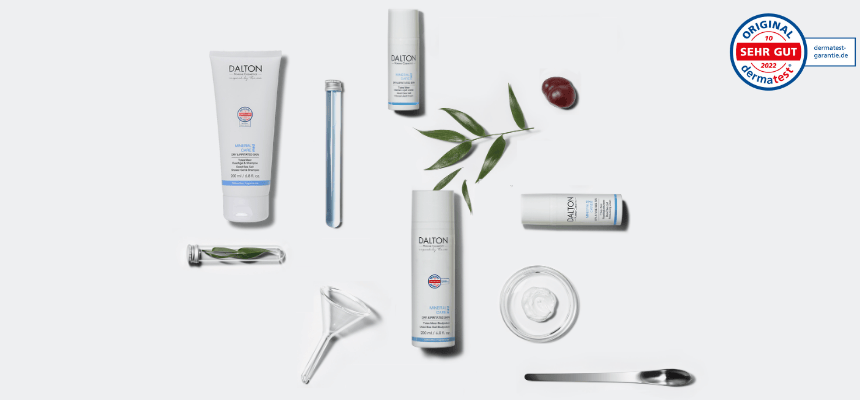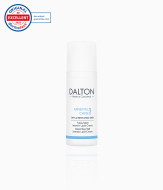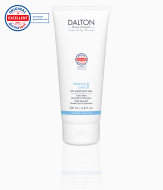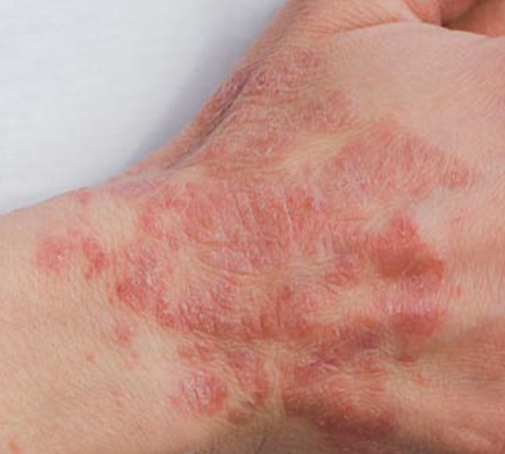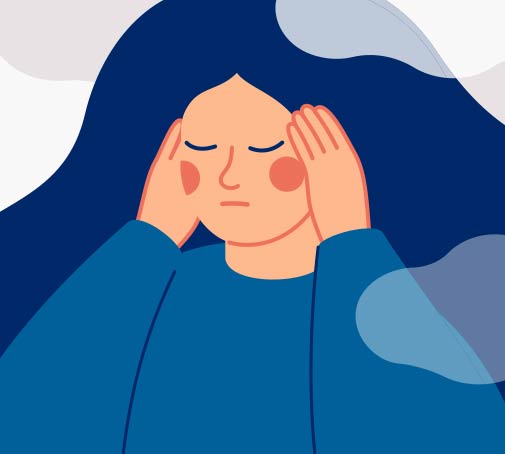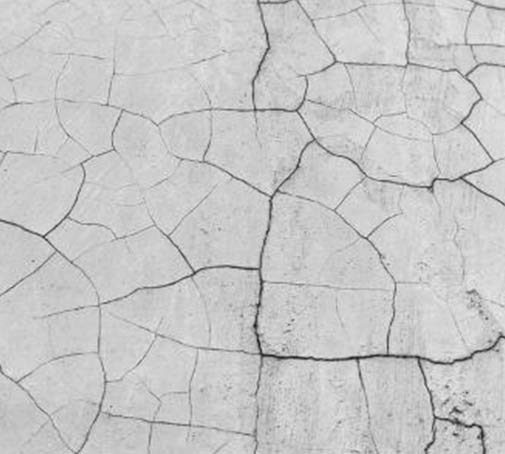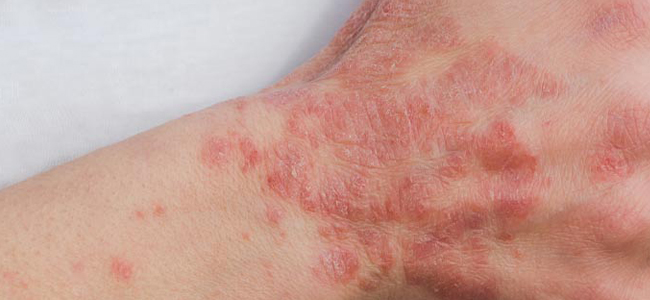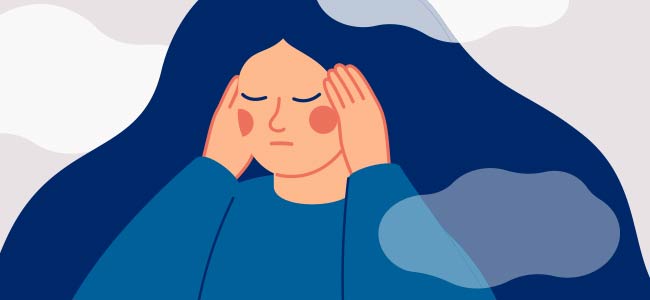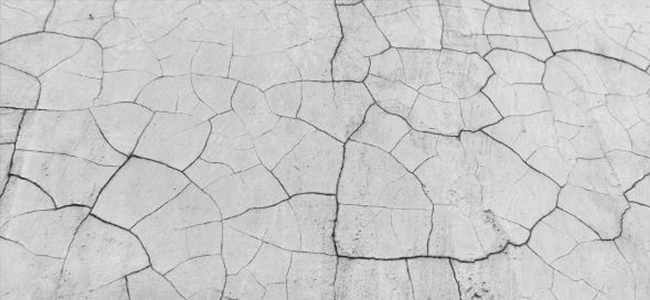
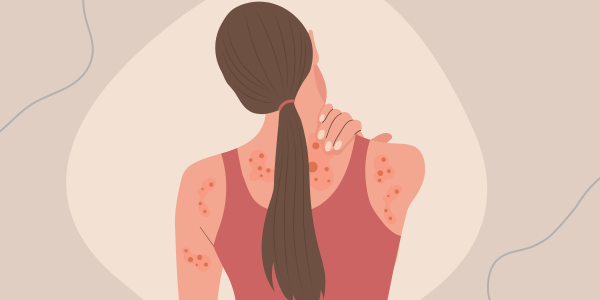
Psoriasis
Psoriasis is one of the most common chronic skin conditions. Around two million people are affected in Germany alone. In this article, we will cover what causes the disease, what treatments are available and what role genetics play in this.
This is what we will be exploring in this article:
• What is psoriatic arthritis?
What is psoriasis?
Psoriasis is a chronic inflammatory disease. It is mainly characterized by red, scaly patches that itch or burn. The symptoms come in flare-ups, which means that there are phases in which they get worse and times in which they improve or disappear completely.
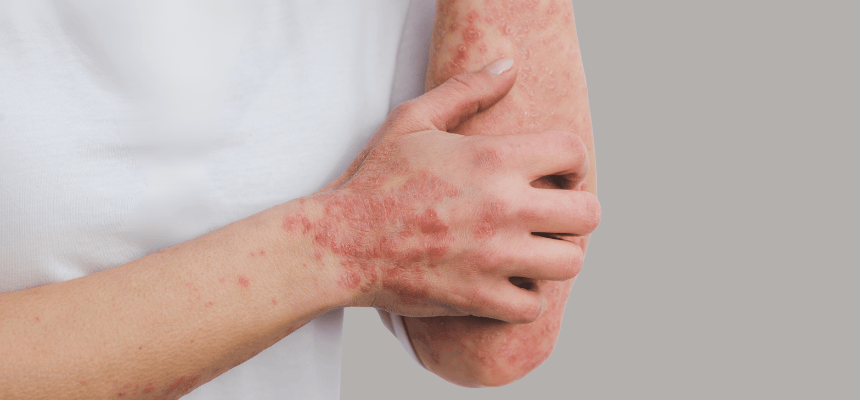

Typical areas of the body where psoriasis occurs are:
- Abdomen
- Back
- Thighs
- Chest
- Buttocks and hipse
- Upper arms
- Hands
Typical areas of the body where psoriasis occurs are:
- Abdomen
- Back
- Thighs
- Chest
- Buttocks and hips
- Upper arms
- Hands
What causes psoriasis?
The exact causes of psoriasis are not yet fully understood, but it is certain that a combination of genetic factors and a misdirection of the immune system is responsible for the development of psoriasis.
Genetic factors: Psoriasis is hereditary. If one parent is affected, the risk for children is around 10–20%. If both parents are affected, the risk increases to around 50%. It is not the symptoms themselves that are inherited, but the likelihood of developing psoriasis.
Misdirection of the immune system: Psoriasis is an autoimmune disease in which the immune system mistakenly attacks healthy skin cells. This is the result of an overactive immune system:
- Certain immune cells are activated and trigger a chain reaction of inflammatory processes in the body.
- This inflammation causes the skin cells to regenerate much faster than in healthy skin – in just 4 to 7 days instead of 28 days.
- The new skin cells accumulate on the surface, which leads to the scaly, red patches of skin psoriasis is known for.
There are also some triggers that can cause the condition to flare up:


Stress
Stress is one of the most common triggers for psoriasis flare-ups. Mental stress can intensify inflammatory responses in the body. Due to the constant stress caused by the disease itself, sufferers can easily fall into a vicious circle that is difficult to break.


Infections
Infections such as strep throat can also play a role in the development of psoriasis. They trigger the immune system, which can lead to psoriasis symptoms.


Injury to the skin
New psoriasis lesions can develop where the skin has been injured, whether by a cut, sunburn or friction. This is known as the Köbner phenomenon.


Stress
Stress is one of the most common triggers for psoriasis flare-ups. Mental stress can intensify inflammatory responses in the body. Due to the constant stress caused by the disease itself, sufferers can easily fall into a vicious circle that is difficult to break.


Infections
Infections such as strep throat can also play a role in the development of psoriasis. They trigger the immune system, which can lead to psoriasis symptoms.


Injury to the skin
New psoriasis lesions can develop where the skin has been injured, whether by a cut, sunburn or friction. This is known as the Köbner phenomenon.


Certain medicines
Some medicines such as beta-blockers (for high blood pressure), lithium (for mental disorders) or certain painkillers can make psoriasis worse.


Environmental conditions
Cold, dry air and little sunlight during the winter season can aggravate psoriasis symptoms, while warm, sunny weather often has a soothing effect.
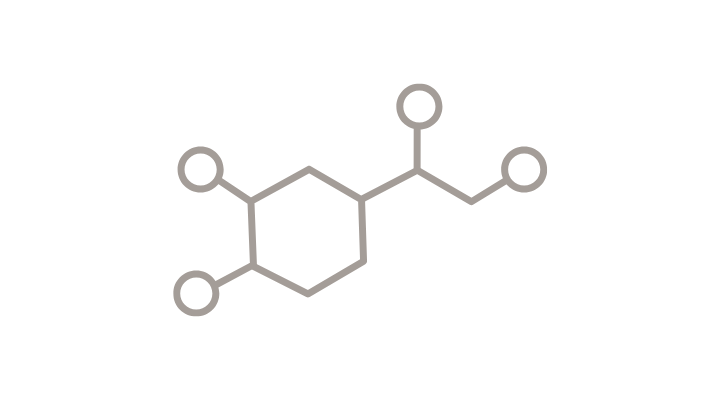

Hormonal changes
Phases of hormonal imbalance, such as puberty, pregnancy or the menopause, can also influence the development of psoriasis.


Certain medicines
Some medicines such as beta-blockers (for high blood pressure), lithium (for mental disorders) or certain painkillers can make psoriasis worse.


Environmental conditions
Cold, dry air and little sunlight during the winter season can aggravate psoriasis symptoms, while warm, sunny weather often has a soothing effect.


Hormonal changes
Phases of hormonal imbalance, such as puberty, pregnancy or the menopause, can also influence the development of psoriasis.
Psoriatic arthritis
In addition to the most common form of psoriasis (psoriasis vulgaris), which has external symptoms, there is also psoriatic arthritis, an inflammatory disease affecting the joints. It occurs in around 20-30% of psoriasis patients. In this form of psoriasis, the immune system attacks the joints and surrounding tissue, leading to inflammation. This inflammation causes pain, swelling and, in advanced stages, damage to the joints. With this type of psoriasis, treatment with medication and long-term therapy under the supervision of a doctor is usually essential to avoid irreversible damage. The choice of treatment depends on the severity of the arthritis, the number of joints affected and the individual needs of the patient.
Treatment options
Unfortunately, psoriasis is not curable, but it is treatable. Depending on the type and severity of the disease, there are various treatment options. It is important to consult a doctor and treat the psoriasis with customized therapy.
External treatments:
- Creams or ointments containing cortisone.
- Vitamin D preparations that regulate the growth of skin cells.
Light therapy: Treating areas of psoriasis with UV light can relieve inflammation and soothe the skin.
Systemic therapy: Medications that regulate immune responses are used for more severe cases of psoriasis.
Alternative treatments: Acupuncture, herbal preparations or relaxation techniques can also help.
Even if factors like genetics can’t be changed, there are a number of things that can be done to reduce the risk of a flare-up or to alleviate symptoms:


- Reduce stress: Yoga, meditation and regular exercise can help.
- Healthy lifestyle: Make sure you eat a balanced diet to keep your body functioning at its best and avoid inflammation and infections. Those affected should also avoid alcohol and smoking, since that can play a role in the development of psoriasis, as can obesity.
- Protect your skin: Especially in winter, it is important to protect the skin from cold and dryness. Dry air from indoor heating is particularly bad for the skin and can also contribute to flare-ups.
- Reduce stress: Yoga, meditation and regular exercise can help.
- Healthy lifestyle: Make sure you eat a balanced diet to keep your body functioning at its best and avoid inflammation and infections. Those affected should also avoid alcohol and smoking, since that can play a role in the development of psoriasis, as can obesity.
- Protect your skin: Especially in winter, it is important to protect the skin from cold and dryness. Dry air from indoor heating is particularly bad for the skin and can also contribute to flare-ups.
Skincare products for psoriasis
Moisturizing and lipid-replenishing formulas
Psoriasis is usually accompanied by extremely dry skin. Opt for lipid-rich creams and lotions that strengthen your skin barrier. Products with ingredients such as urea or panthenol are ideal. Our MINERAL CARE MED products are specifically developed for skin prone to eczema or psoriasis. All products contain original Dead Sea salt and help to alleviate itching skin. They are dermatologically tested with a rating of "excellent“. The collection contains two face creams to choose from, depending on your current skin needs.
Our Dead Sea Salt Moisturizing Cream is ideal for daily use on the face and provides dry skin with intense moisture. Nourishing lipids such as shea butter and jojoba oil soothe irritated skin without leaving a greasy film.
For the body, you can use the Dead Sea Salt Body Lotion. It is fast-absorbing and provides long-lasting relief from itching.
For severely affected areas, you can use the Dead Sea Salt Intense Lipid Cream. It has an ointment-like texture and can also be used to treat areas such as the elbows, crooks of the arms or knees. The cream supports the restoration of an intact skin barrier and alleviates itching.
Our Dead Sea Salt Moisturizing Cream is ideal for daily use on the face and provides dry skin with intense moisture. Nourishing lipids such as shea butter and jojoba oil soothe irritated skin without leaving a greasy film.
For the body, you can use the Dead Sea Salt Body Lotion. It is fast-absorbing and provides long-lasting relief from itching.
For severely affected areas, you can use the Dead Sea Salt Intense Lipid Cream. It has an ointment-like texture and can also be used to treat areas such as the elbows, crooks of the arms or knees. The cream supports the restoration of an intact skin barrier and alleviates itching.
Gentle cleansing
Many psoriasis patients struggle with very dry, scaly skin, especially on the scalp. Be sure to avoid aggressive shower gels and shampoos. Instead, use pH-neutral or soap-free products that do not strip your skin of moisture. Our MINERAL CARE MED Shampoo & Shower Gel is a perfect choice. It contains plant-based surfactants that provide gentle cleansing and help to prevent a flaky scalp.
What about exfoliation?
Even if it might seem logical at first to exfoliate the skin, (since it removes dead skin cells and flaky patches), we can only advise against it. Exfoliation stimulates the natural skin renewal process which is already accelerated in psoriasis patients. Exfoliating may give you the feeling of getting rid of flaky skin for the moment, but in the long term it is more likely to make psoriasis worse.


Beauty editor

